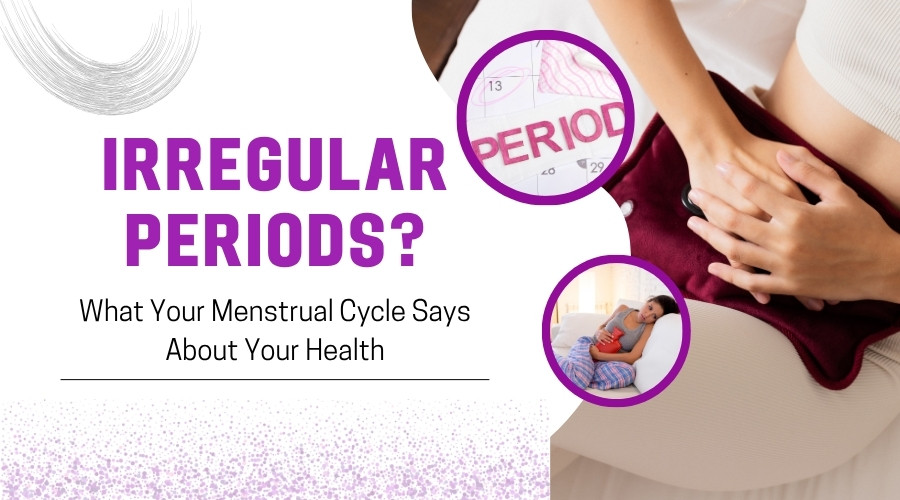
Your menstrual cycle is more than just a monthly occurrence—it’s a vital sign that reflects the overall health of your body. Many women experience irregular periods at some point in their lives, often brushing them off as normal fluctuations. However, persistent irregularities could be your body’s way of signaling that something needs attention.
At Drpreetitandon, we believe in empowering women with the knowledge they need to understand their bodies better. Let’s explore what irregular periods could mean for your health, and when it’s time to take action.
What Is Considered an Irregular Period?
A “normal” menstrual cycle typically lasts between 21 to 35 days, and most periods last 2 to 7 days. While occasional variations are common, you may have irregular periods if:
- Your cycle length changes significantly month to month
- You skip periods altogether without pregnancy
- Your period is unusually heavy or light
- You bleed between periods
These changes are often symptoms, not diseases, and may point to underlying health conditions.
1. Hormonal Imbalance
Hormones like estrogen and progesterone regulate your menstrual cycle. When these hormones are out of balance, it can lead to irregular or missed periods. Some common hormonal causes include:
- Polycystic Ovary Syndrome (PCOS): One of the most common causes of irregular periods, PCOS is associated with elevated androgens, ovarian cysts, and insulin resistance.
- Thyroid Disorders: Both an underactive and overactive thyroid can disrupt your cycle.
- Perimenopause: As women approach menopause, hormonal fluctuations often lead to unpredictable periods.
At Drpreetitandon, we perform detailed hormonal assessments to help you identify the root cause and manage symptoms effectively.
2. Stress and Lifestyle Factors
Stress affects your hypothalamus, a part of the brain that regulates hormones. Intense emotional or physical stress can delay ovulation or even stop your period temporarily. Other lifestyle factors that may lead to irregularities include:
- Extreme weight loss or gain
- Excessive exercise
- Poor sleep
- Nutritional deficiencies
Restoring balance through mindful lifestyle adjustments—including proper nutrition, exercise, and stress management—is a powerful first step toward a regular cycle.
3. Underlying Medical Conditions
Irregular periods may also be linked to underlying conditions that require medical attention:
- • Endometriosis: A painful disorder where tissue similar to the lining of the uterus grows outside it, affecting the cycle.
- • Fibroids: Noncancerous growths in the uterus can cause heavy, prolonged, or irregular bleeding.
- Diabetes and Insulin Resistance: These conditions can interfere with hormone levels, often leading to irregular menstruation.
At Drpreetitandon, our approach includes thorough diagnostic tests and personalized care plans to address these complex issues.
4. Birth Control and Medications
Hormonal birth control methods can alter the frequency and flow of your periods. In some cases, they may cause missed or lighter periods. Similarly, certain medications—especially psychiatric drugs, steroids, or chemotherapy—can impact your cycle.
If you’ve recently started or stopped any medication and notice changes in your period, it’s wise to consult a healthcare provider.
5. Fertility Implications
Irregular periods can make it more difficult to track ovulation, which may affect your ability to conceive. Women with PCOS or thyroid disorders often struggle with fertility due to irregular ovulation cycles.
That said, many of these conditions are treatable, and understanding your cycle is the first step in improving fertility. At Drpreetitandon, we support women through fertility planning, hormone balancing, and holistic reproductive health care.
When to See a Doctor
Irregular periods aren’t always cause for concern, but you should consult a doctor if:
- You haven’t had a period in more than 3 months (and are not pregnant)
- Your periods are suddenly very heavy, painful, or last longer than 7 days
- You bleed between periods or after sex
- Your cycle is consistently shorter than 21 days or longer than 35 days
Early detection and treatment of the underlying causes can improve both reproductive and overall health.
How We Can Help at Drpreetitandon
Our team at DrPreetiTandon takes a comprehensive and compassionate approach to women’s health. We combine modern diagnostics with patient-centered care to uncover the root causes of menstrual irregularities. From hormonal therapy and nutrition guidance to fertility support and PCOS management, we tailor each treatment plan to meet your individual needs.
Your menstrual cycle offers valuable insights into your overall health. Irregular periods are often your body’s way of telling you that something’s off—whether it’s hormonal, lifestyle-related, or a more serious medical condition.
Rather than ignoring the signs, take action. At Drpreetitandon, we’re here to help you decode your cycle, regain balance, and take control of your reproductive health.



